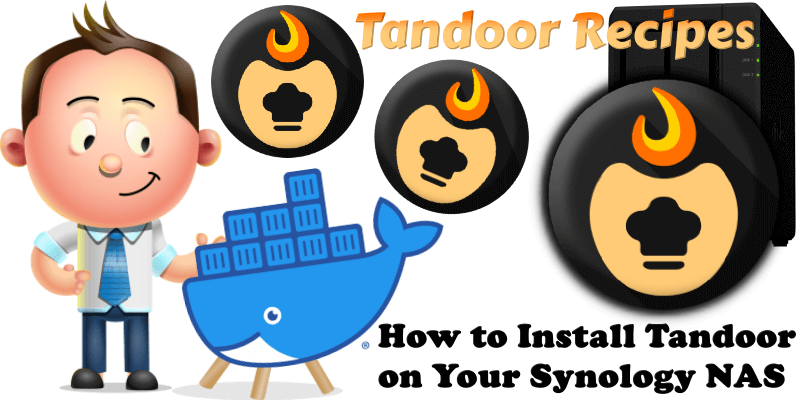
With Tandoor Recipes you can easily manage your recipes with a fast and intuitive editor. Shop lists via the meal plan or straight from recipes with a powerful & customizable search. Tandoor is build around the values of Open Source software and using modern technologies. No tracking, no analytics, just your recipes. Tandoor Recipes is an alternative to Mealie. In this step by step guide I will show you how to install Tandoor Recipes on your Synology NAS using Docker & Portainer.
This guide works perfectly with the latest Tandoor Recipes v2.3.6 release.
STEP 1
Please Support My work by Making a Donation.
STEP 2
Install Portainer using my step by step guide. If you already have Portainer installed on your Synology NAS, skip this STEP. Attention: Make sure you have installed the latest Portainer version.
STEP 3
Make sure you have a synology.me Wildcard Certificate. Follow my guide to get a Wildcard Certificate. If you already have a synology.me Wildcard certificate, skip this STEP.
STEP 4
Go to Control Panel / Login Portal / Advanced Tab / click Reverse Proxy. Follow the instructions in the image below.
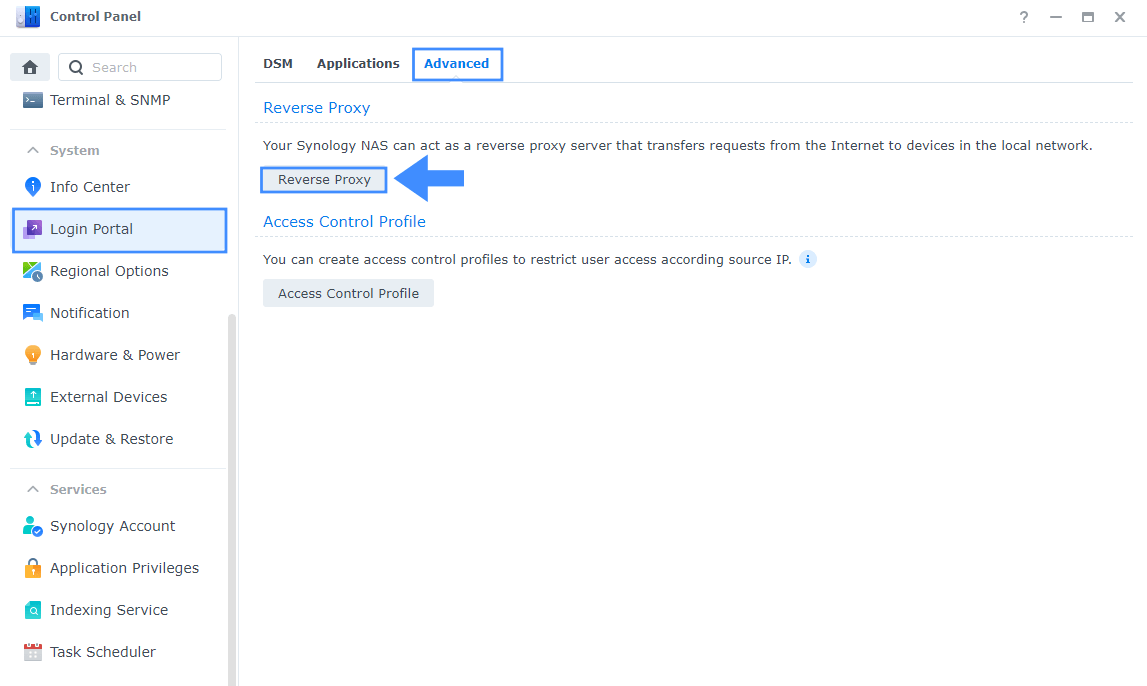
STEP 5
Now click the “Create” button. Follow the instructions in the image below.
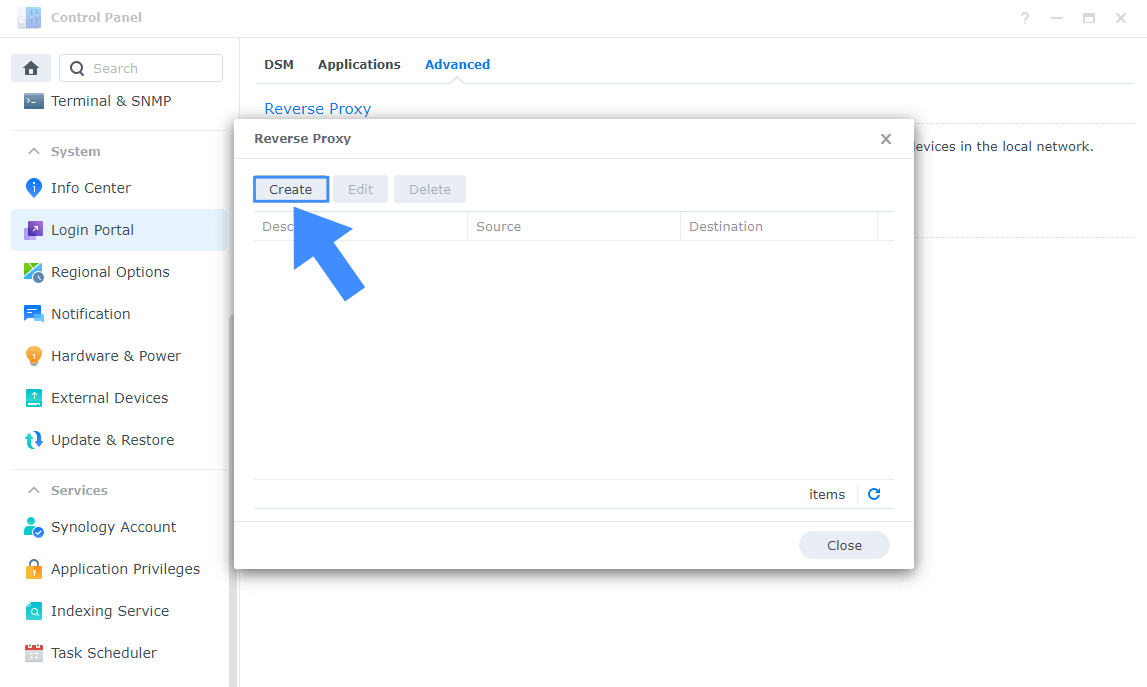
STEP 6
After you click the Create button, the window below will open. Follow the instructions in the image below.
On the General area, set the Reverse Proxy Name description: type in Tandoor. After that, add the following instructions:
Source:
Protocol: HTTPS
Hostname: tandoor.yourname.synology.me
Port: 443
Check Enable HSTS
Destination:
Protocol: HTTP
Hostname: localhost
Port: 9815
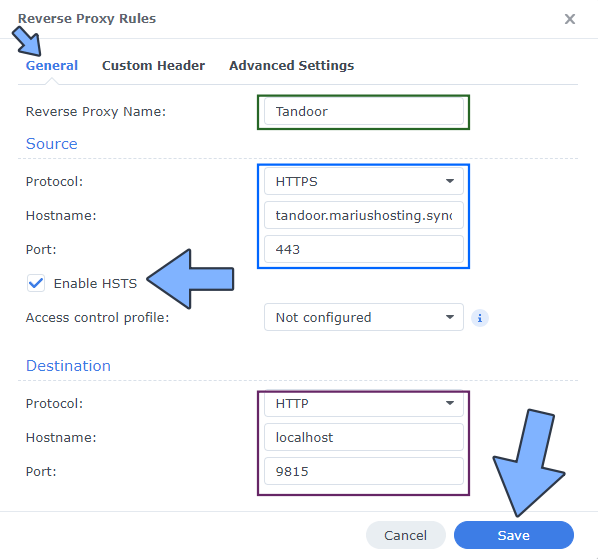
STEP 7
On the Reverse Proxy Rules click the Custom Header tab. Click Create and then, from the drop-down menu, click WebSocket. After you click on WebSocket, two Header Names and two Values will be automatically added. Click Save. Follow the instructions in the image below.

STEP 8
Go to Control Panel / Network / Connectivity tab/ Check Enable HTTP/2 then click Apply. Follow the instructions in the image below.
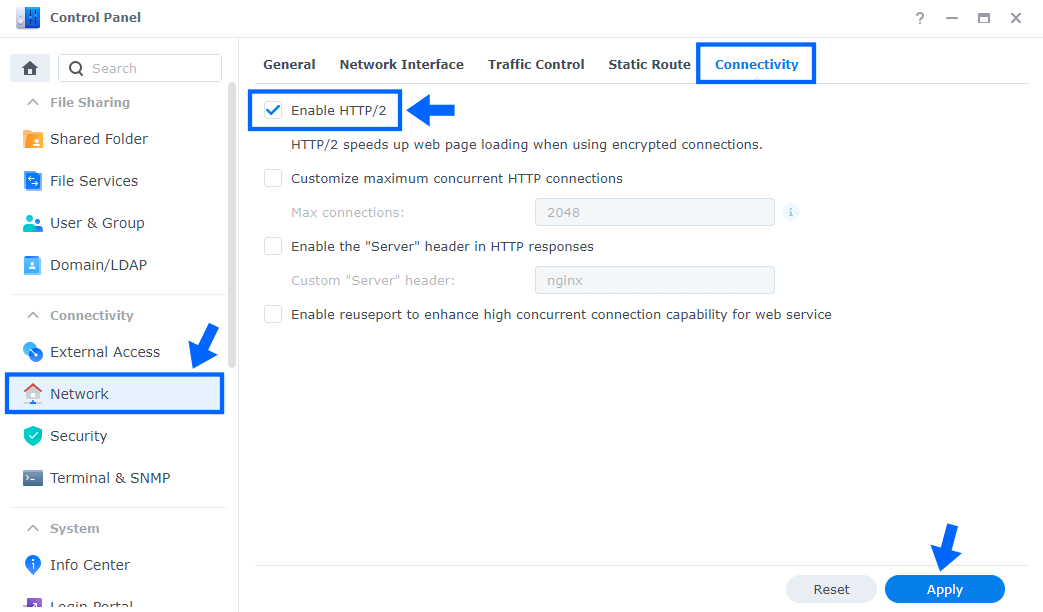
STEP 9
Go to Control Panel / Security / Advanced tab/ Check Enable HTTP Compression then click Apply. Follow the instructions in the image below.
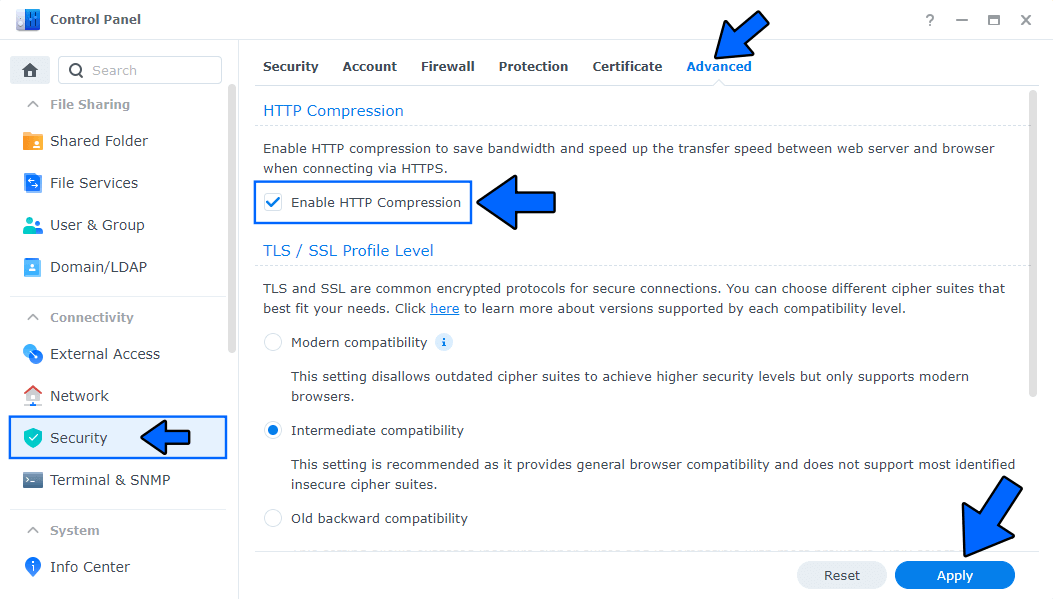
STEP 10
Go to File Station and open the docker folder. Inside the docker folder, create one new folder and name it tandoor. Follow the instructions in the image below.
Note: Be careful to enter only lowercase, not uppercase letters.
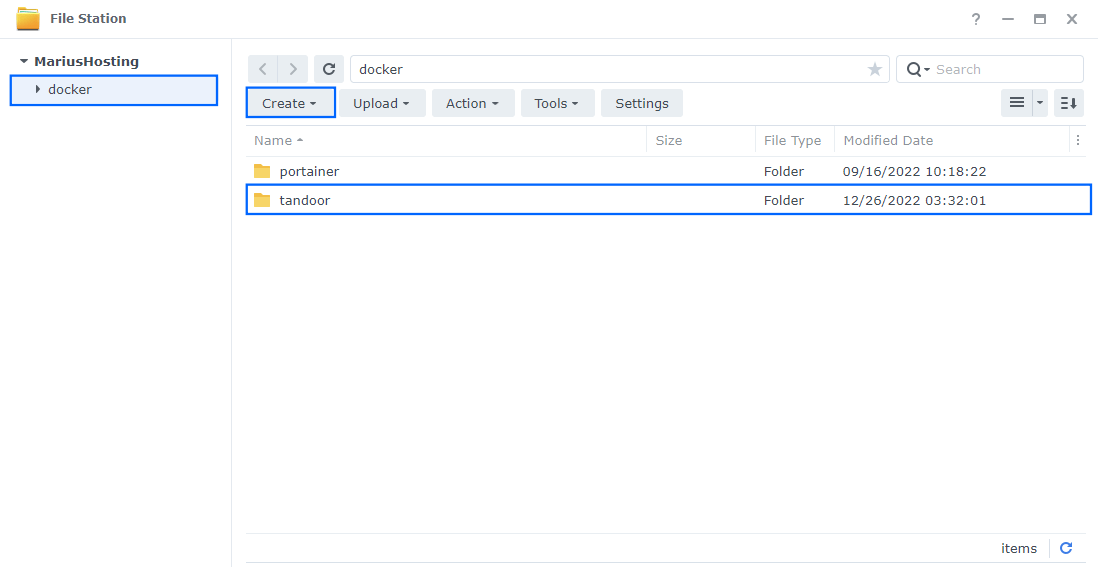
STEP 11
Now create three new folders inside the tandoor folder that you created at STEP 10 and name them db, mediafiles, staticfiles. Follow the instructions in the image below.
Note: Be careful to enter only lowercase, not uppercase letters.
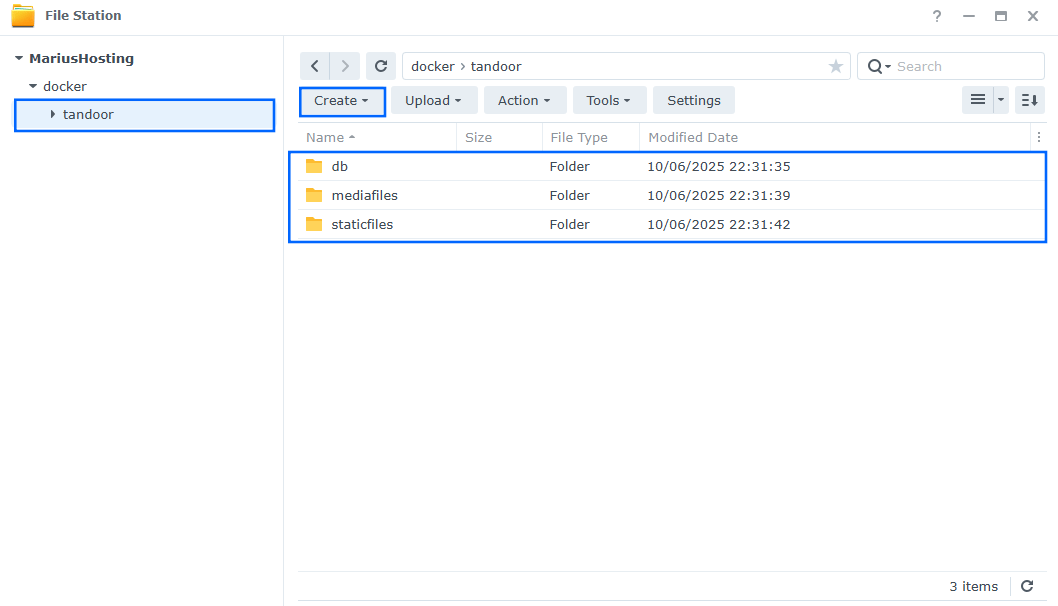
STEP 12
Follow my step by step guide on how to activate SMTP for your Gmail account. This step is mandatory. Note: If you don’t want to use the easiest way for SMTP with Google and you already have SMTP details from your own Mail Server, you can just skip this STEP and use your personalized email SMTP details instead.
STEP 13
Log into Portainer using your username and password. On the left sidebar in Portainer, click on Home then Live connect. Follow the instructions in the image below.

On the left sidebar in Portainer, click on Stacks then + Add stack. Follow the instructions in the image below.

STEP 14
In the Name field type in tandoor. Follow the instructions in the image below.
services:
db:
image: postgres:18
container_name: Tandoor-DB
hostname: tandoor-db
security_opt:
- no-new-privileges:true
healthcheck:
test: ["CMD", "pg_isready", "-q", "-d", "tandoor", "-U", "tandooruser"]
timeout: 45s
interval: 10s
retries: 10
volumes:
- /volume1/docker/tandoor/db:/var/lib/postgresql:rw
env_file:
- stack.env
restart: on-failure:5
tandoor:
image: vabene1111/recipes:latest
container_name: Tandoor
hostname: tandoor
security_opt:
- no-new-privileges:true
healthcheck:
test: wget --no-verbose --tries=1 --spider http://localhost:80 || exit 1
volumes:
- /volume1/docker/tandoor/staticfiles:/opt/recipes/staticfiles:rw
- /volume1/docker/tandoor/mediafiles:/opt/recipes/mediafiles:rw
env_file:
- stack.env
ports:
- 9815:80
restart: on-failure:5
depends_on:
db:
condition: service_started
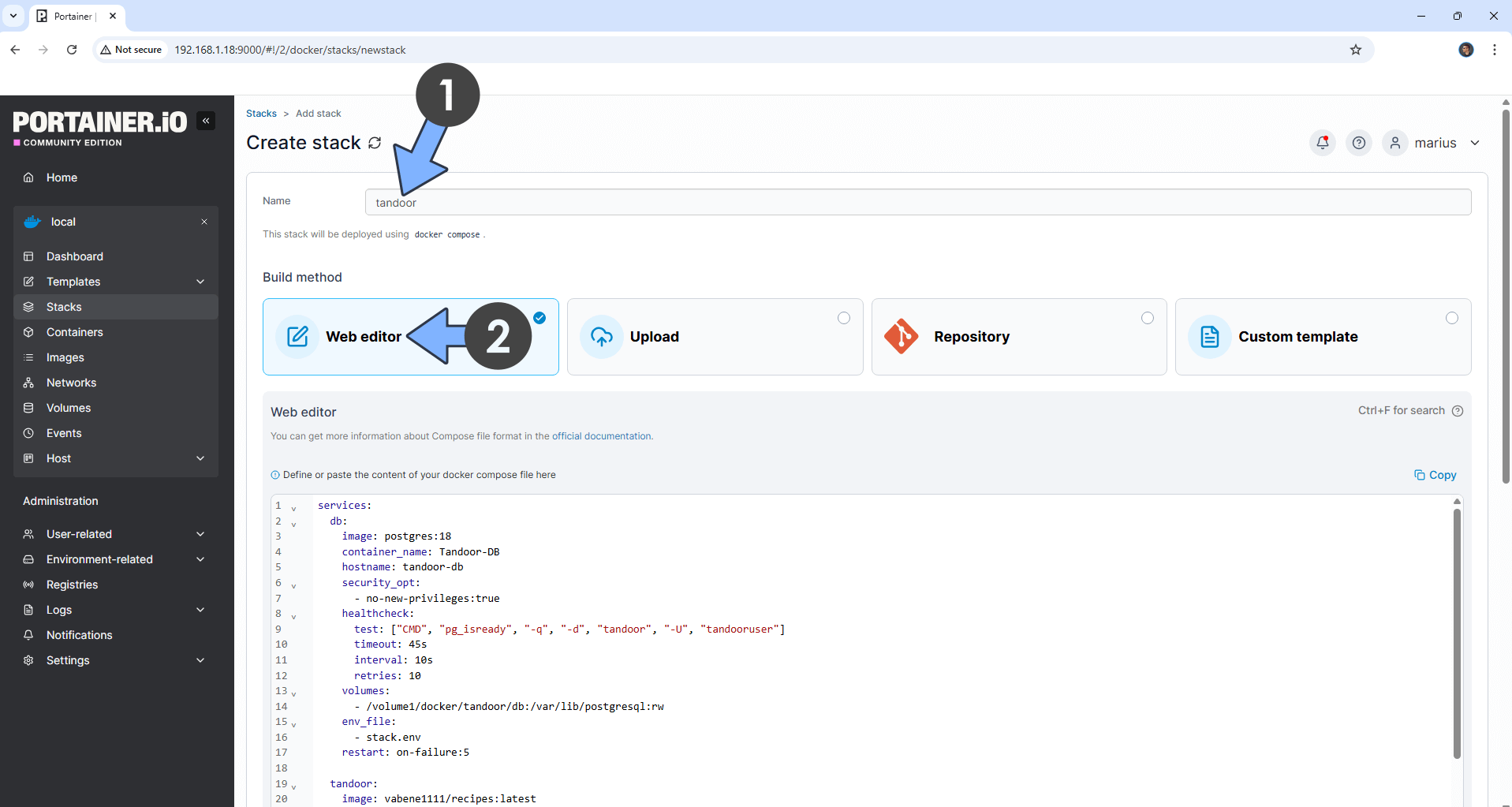
STEP 15
Click the Upload button after Web editor. Download the stack.env file by clicking the blue link below and then upload it from your computer in the “Load variables from .env files“. Follow the instructions in the image below. 🔒Note: Support my work to unlock the password.
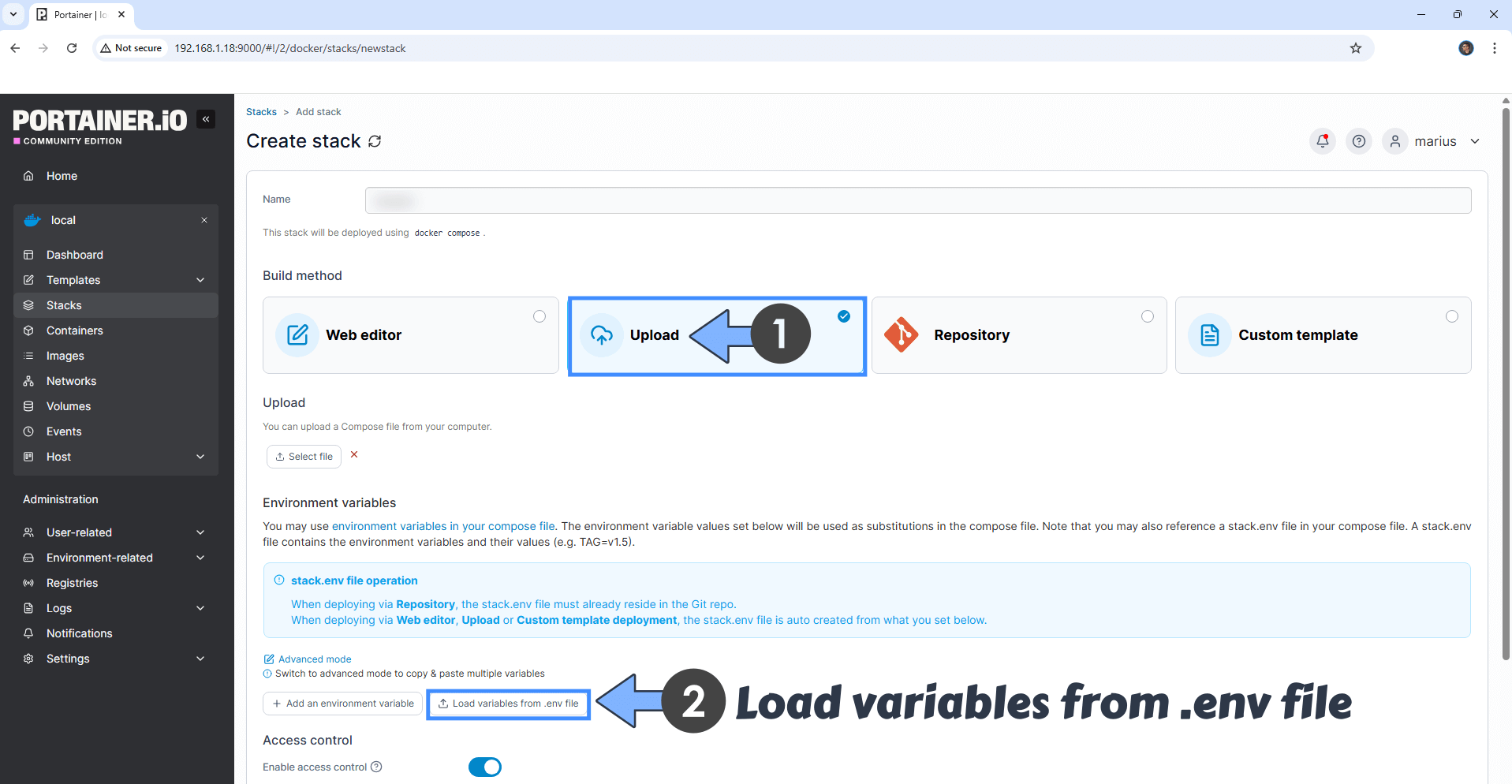
STEP 16
Note: On the Environment variables change the value for SECRET_KEY and add your own 64 length SECRET KEY. (Generate your own FREE Random 64 length SECRET_KEY.)
Note: On the Environment variables change the value for TZ (TimeZone). (Select your current Time Zone from this list.)
Note: On the Environment variables change the values for DEFAULT_FROM_EMAIL and type in your own Gmail address that you have previously used at STEP 12.
Note: On the Environment variables change the values for EMAIL_HOST_USER and type in your own Gmail address that you have previously used at STEP 12.
Note: On the Environment variables change the values for EMAIL_HOST_PASSWORD and type in your own Gmail APP Password that you have previously generated at STEP 12. ⚠️Warning: Do NOT confuse with your own Gmail password. This is the Gmail APP password.
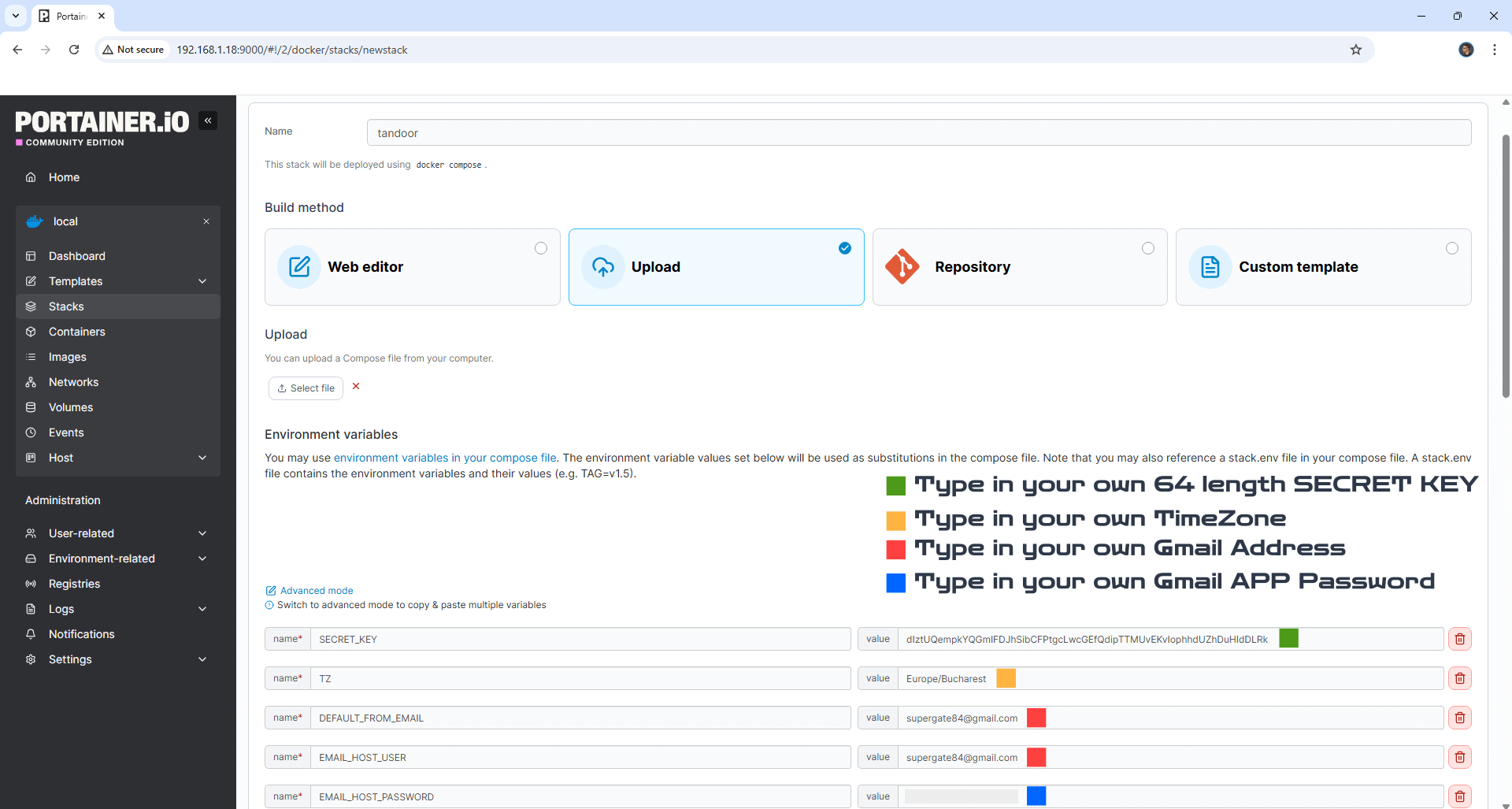
STEP 17
After you make the changes, click the Web editor button. Follow the instructions in the image below.
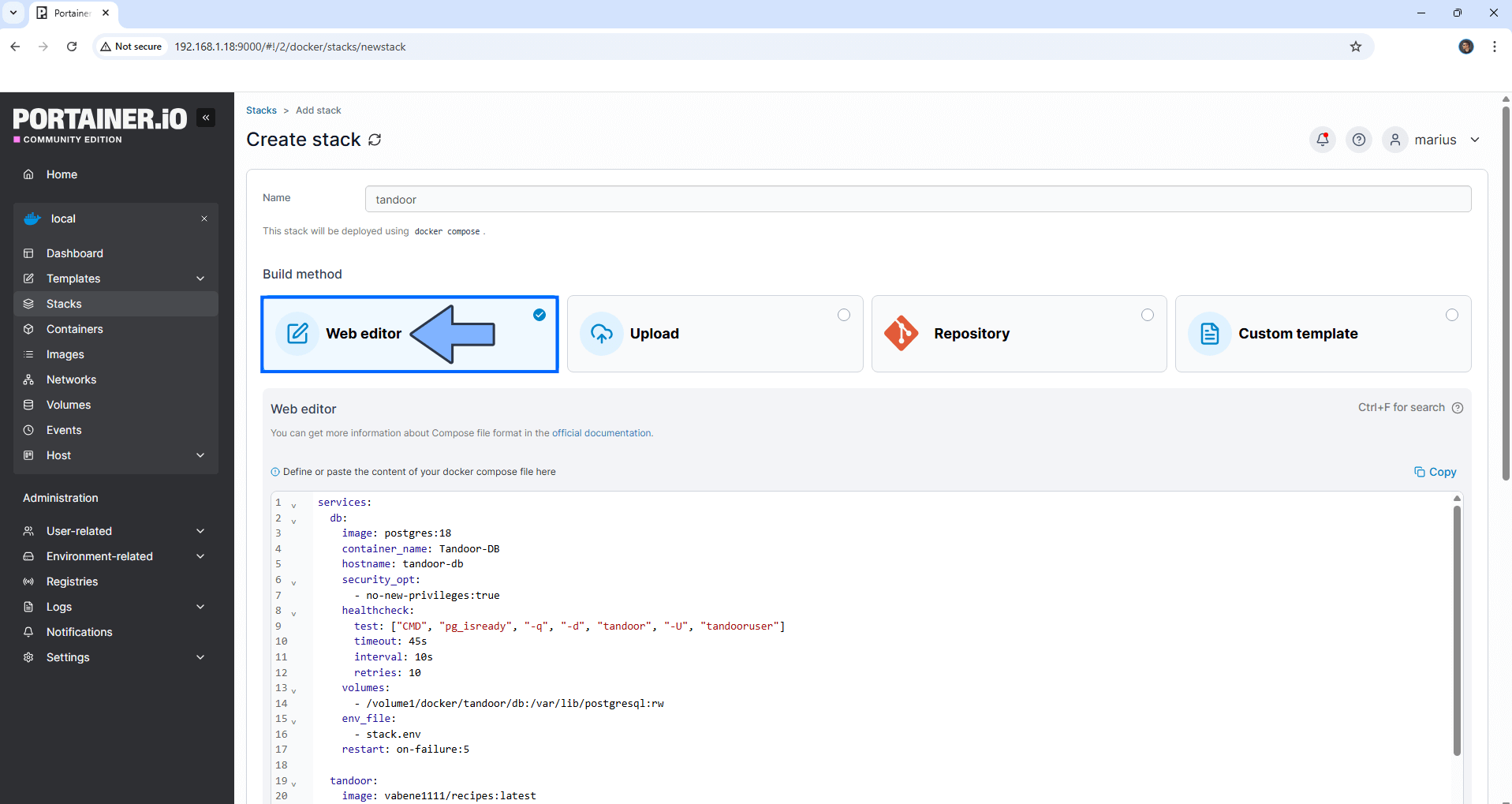
STEP 18
Scroll down on the page until you see a button named Deploy the stack. Click on it. Follow the instructions in the image below. The installation process can take up to a few minutes. It will depend on your Internet speed connection.
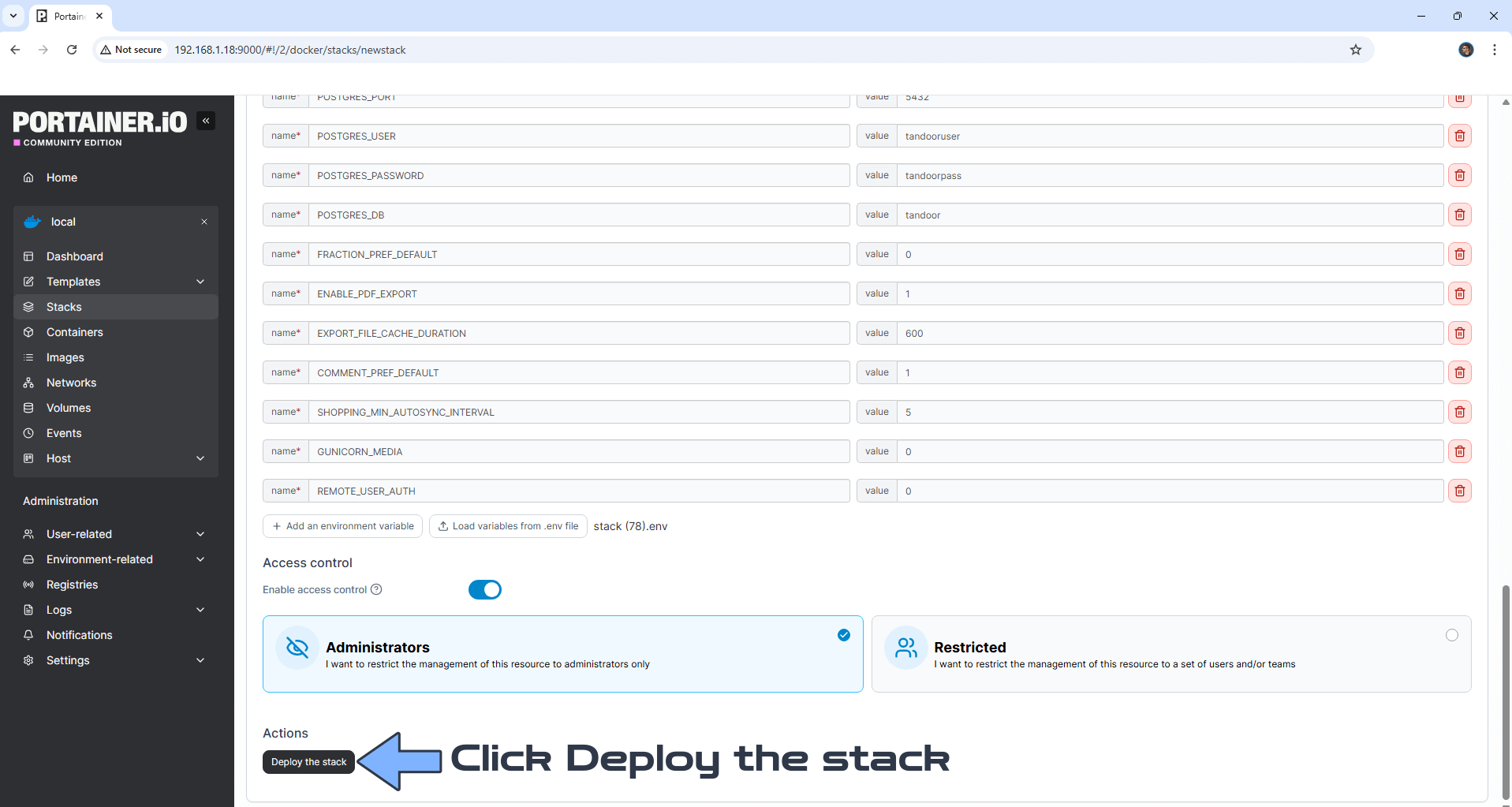
STEP 19
If everything goes right, you will see the following message at the top right of your screen: “Success Stack successfully deployed“.

STEP 20
🟢Please Support My work by Making a Donation. Almost 99,9% of the people that install something using my guides forget to support my work, or just ignore STEP 1. I’ve been very honest about this aspect of my work since the beginning: I don’t run any ADS, I don’t require subscriptions, paid or otherwise, I don’t collect IPs, emails, and I don’t have any referral links from Amazon or other merchants. I also don’t have any POP-UPs or COOKIES. I have repeatedly been told over the years how much I have contributed to the community. It’s something I love doing and have been honest about my passion since the beginning. But I also Need The Community to Support me Back to be able to continue doing this work.
STEP 21
Wait approximately 2 minutes or you will get a 502 Bad Gateway error if you open the page too fast. Now open your browser and type in your HTTPS/SSL certificate like this https://tandoor.yourname.synology.me In my case it’s https://tandoor.mariushosting.synology.me If everything goes right, you will see the Tandoor Setup page. Type in your own Username and Password then click Create Superuser account. Follow the instructions in the image below.
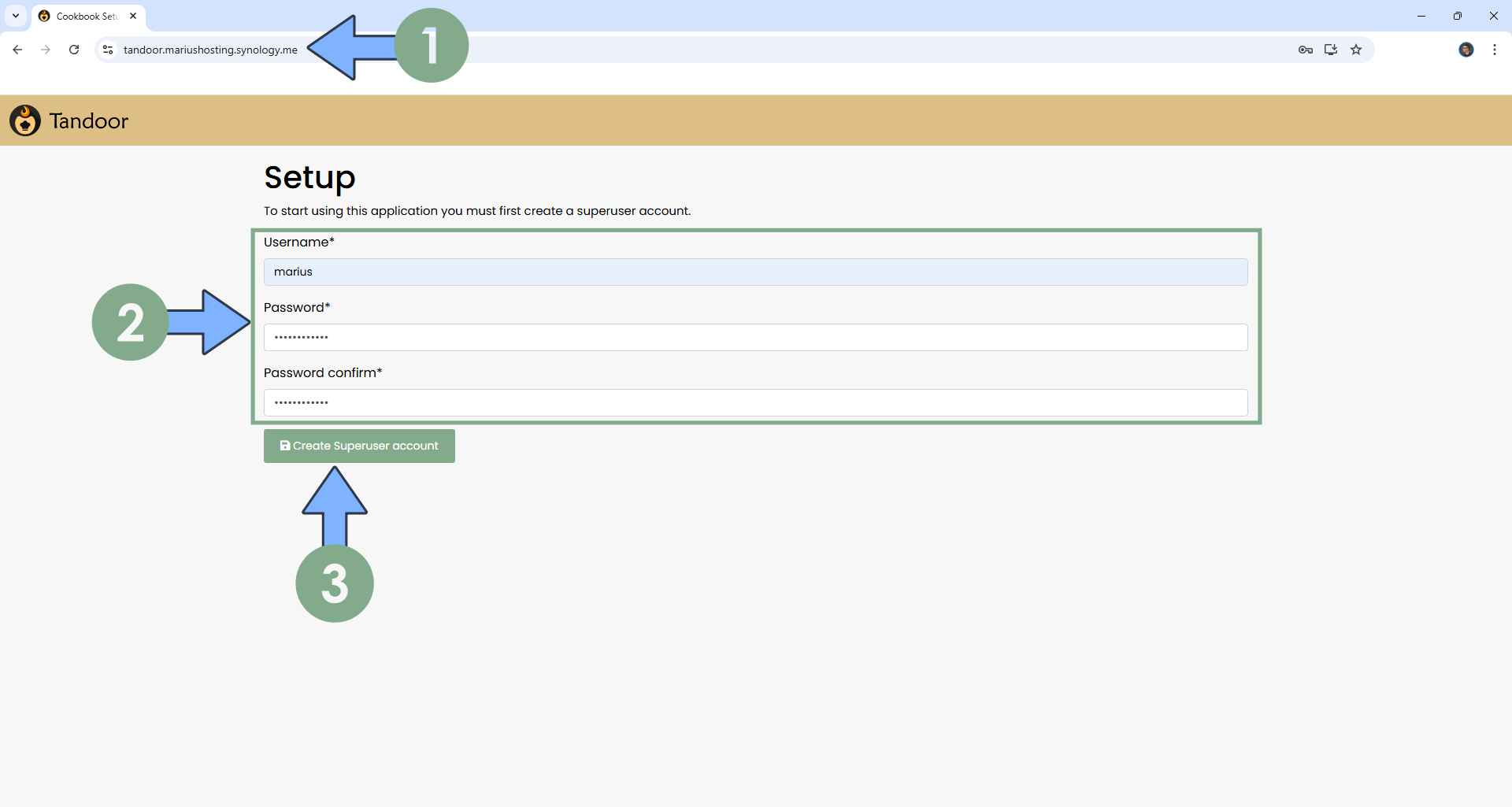
STEP 22
User has been created! Type in your own Username and Password that you have previously created at STEP 21, then click Sign In. Follow the instructions in the image below.
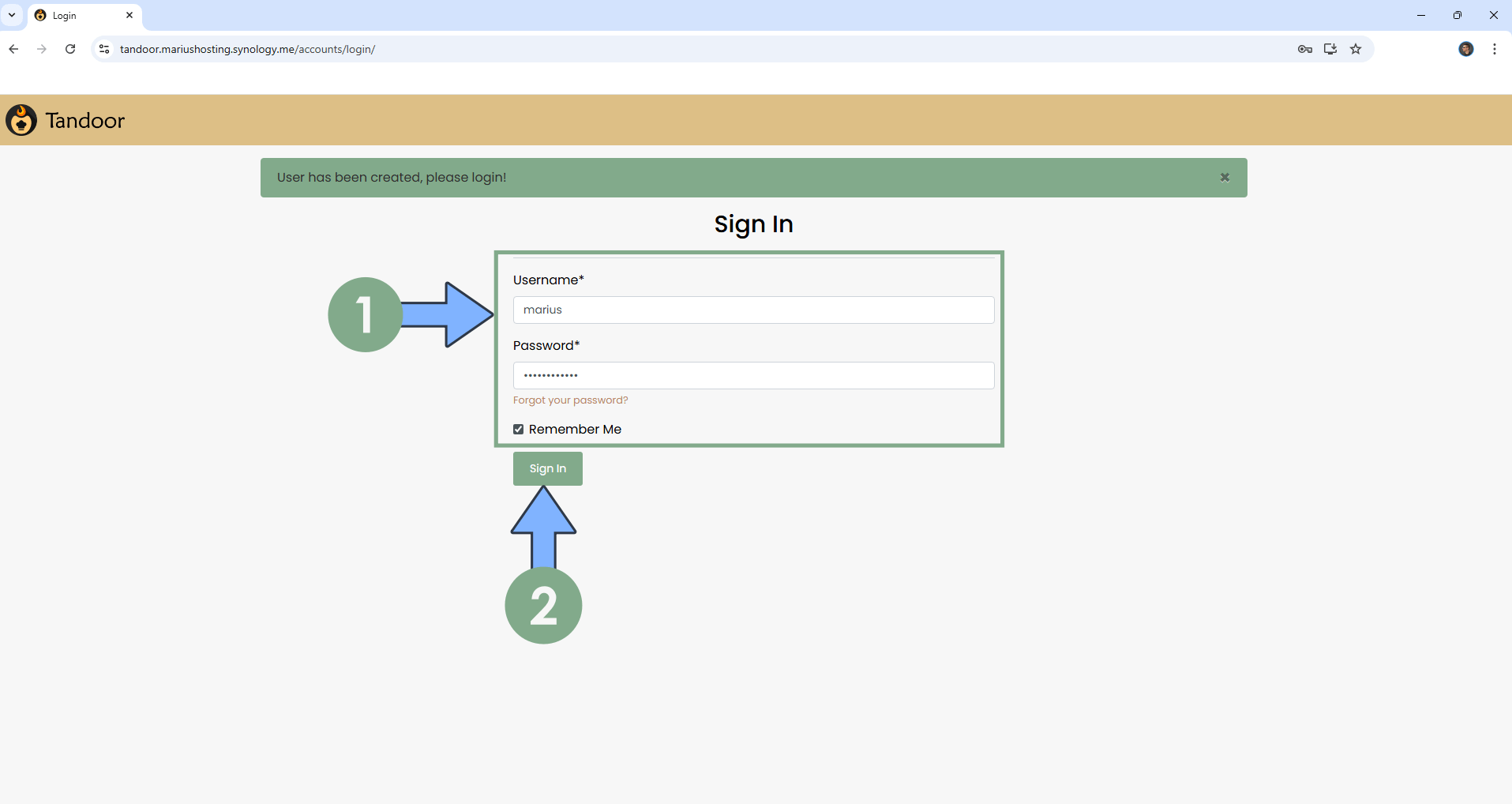
STEP 23
Click NEXT. Follow the instructions in the image below.
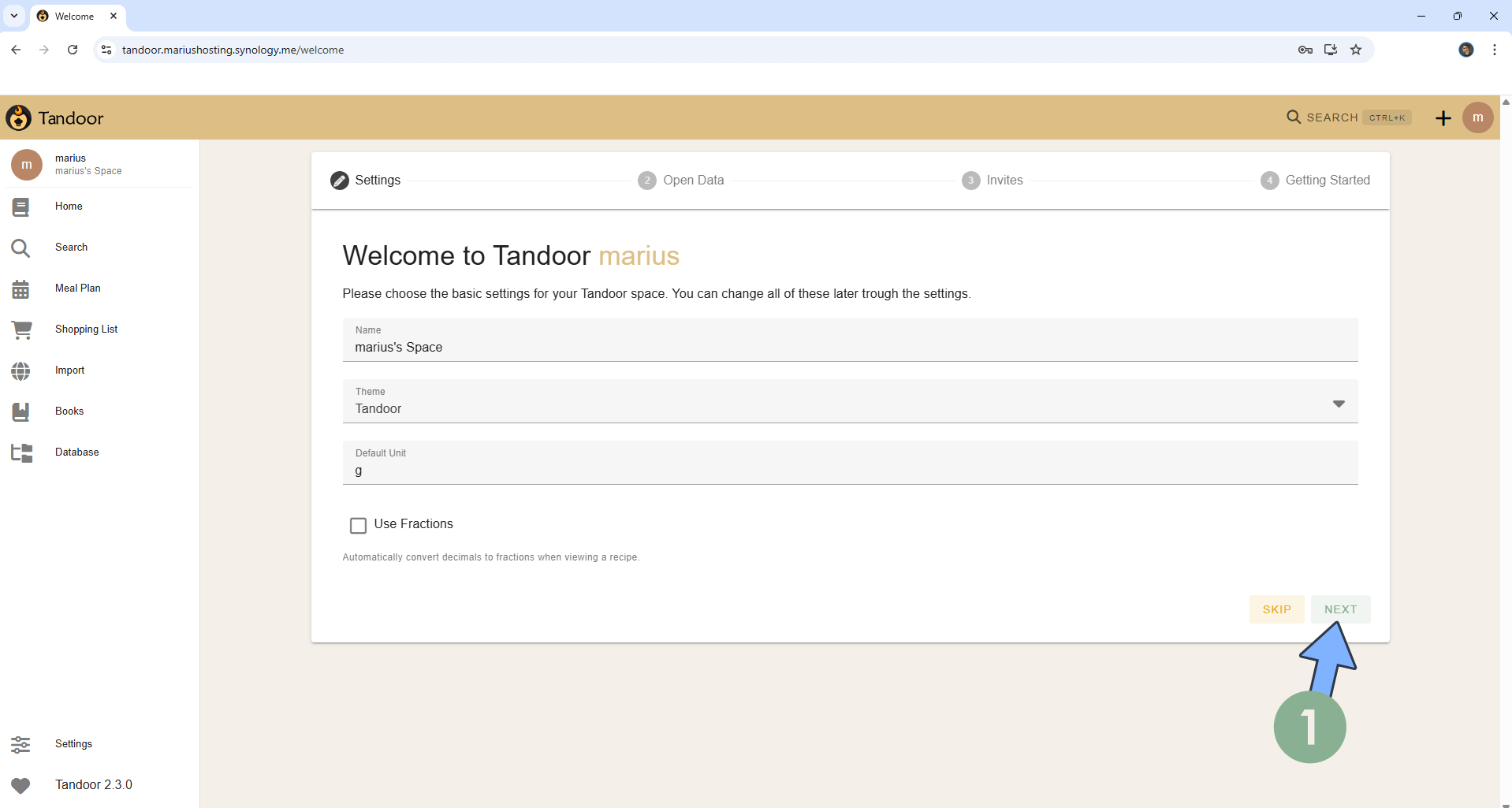
STEP 24
Click NEXT or Import your own Data. Follow the instructions in the image below.
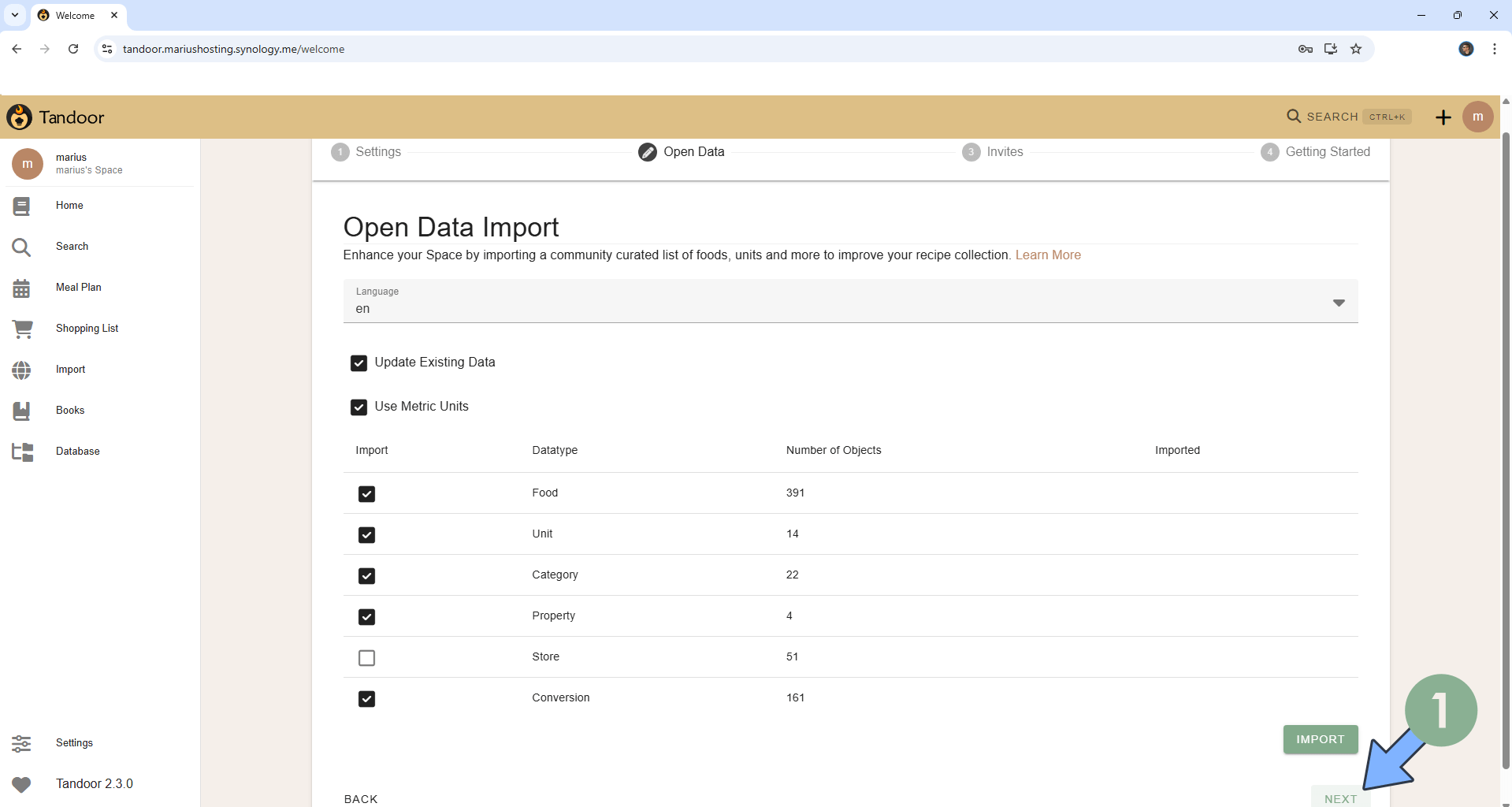
STEP 25
If you have correctly set up the Email at STEP 16, you can also invite someone to your Tandoor Space. Click NEXT. Follow the instructions in the image below.
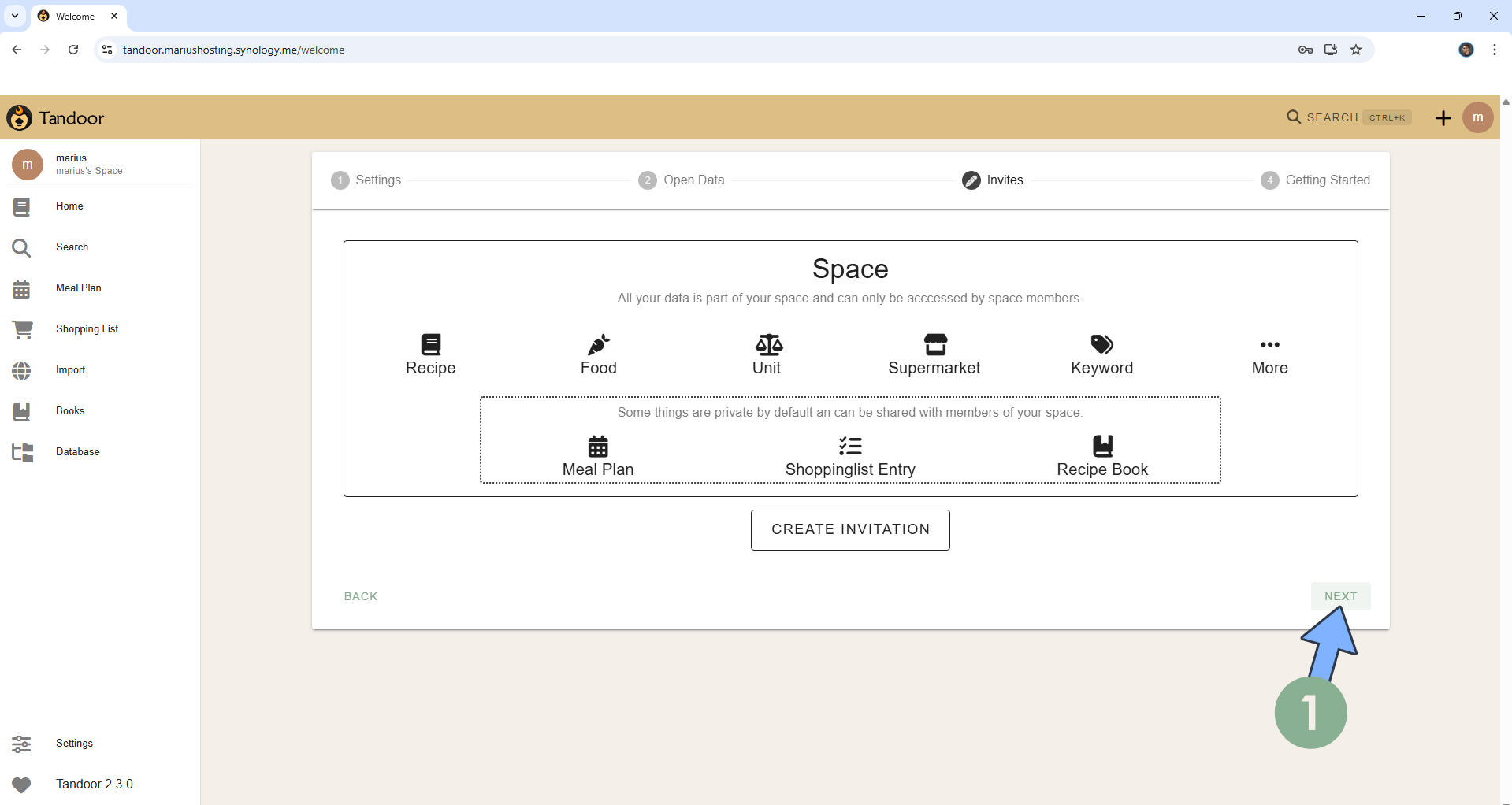
STEP 26
Click FINISH. Follow the instructions in the image below.
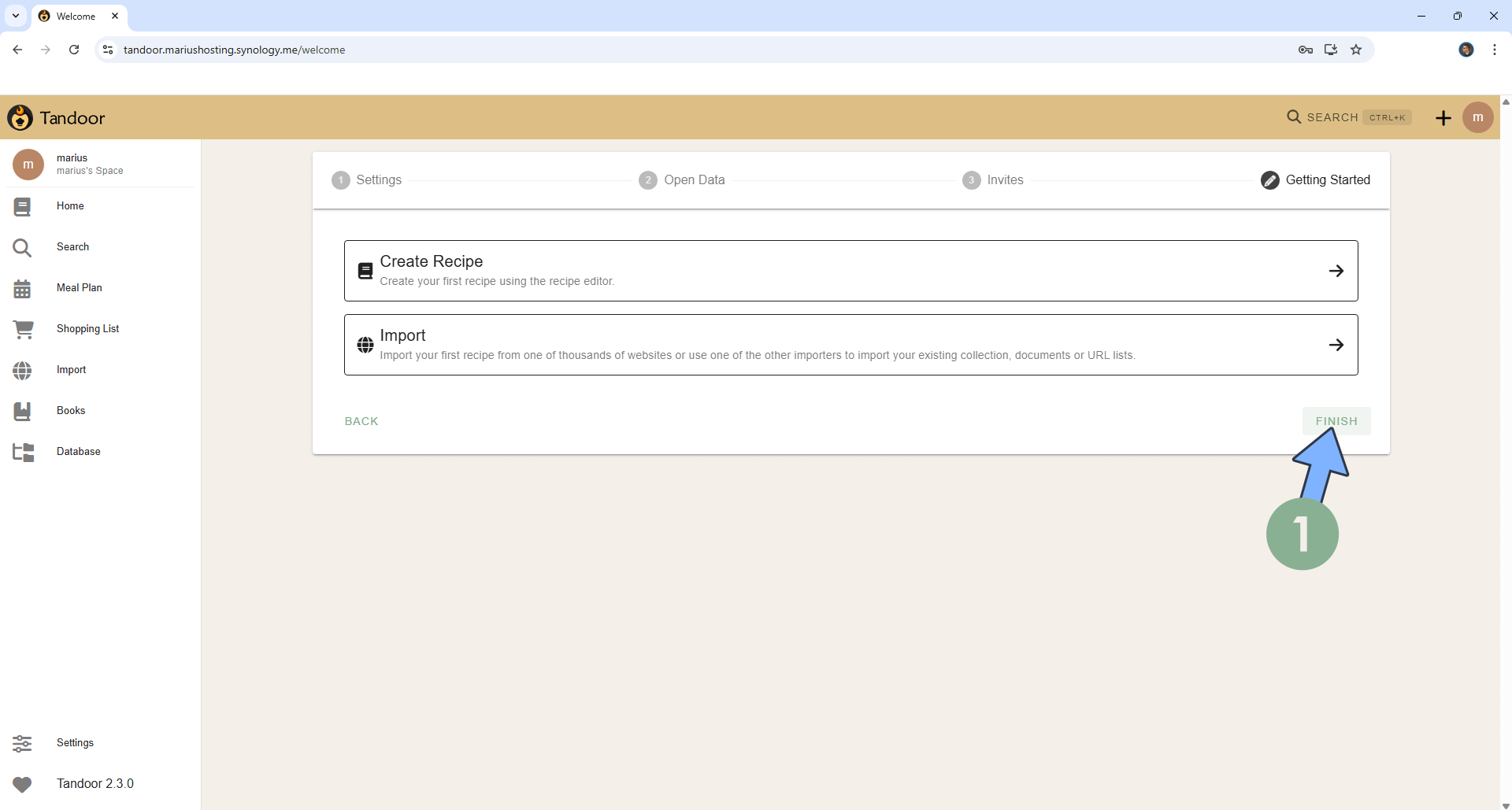
STEP 27
Your Tandoor Space at a glance! Click Settings. Follow the instructions in the image below.
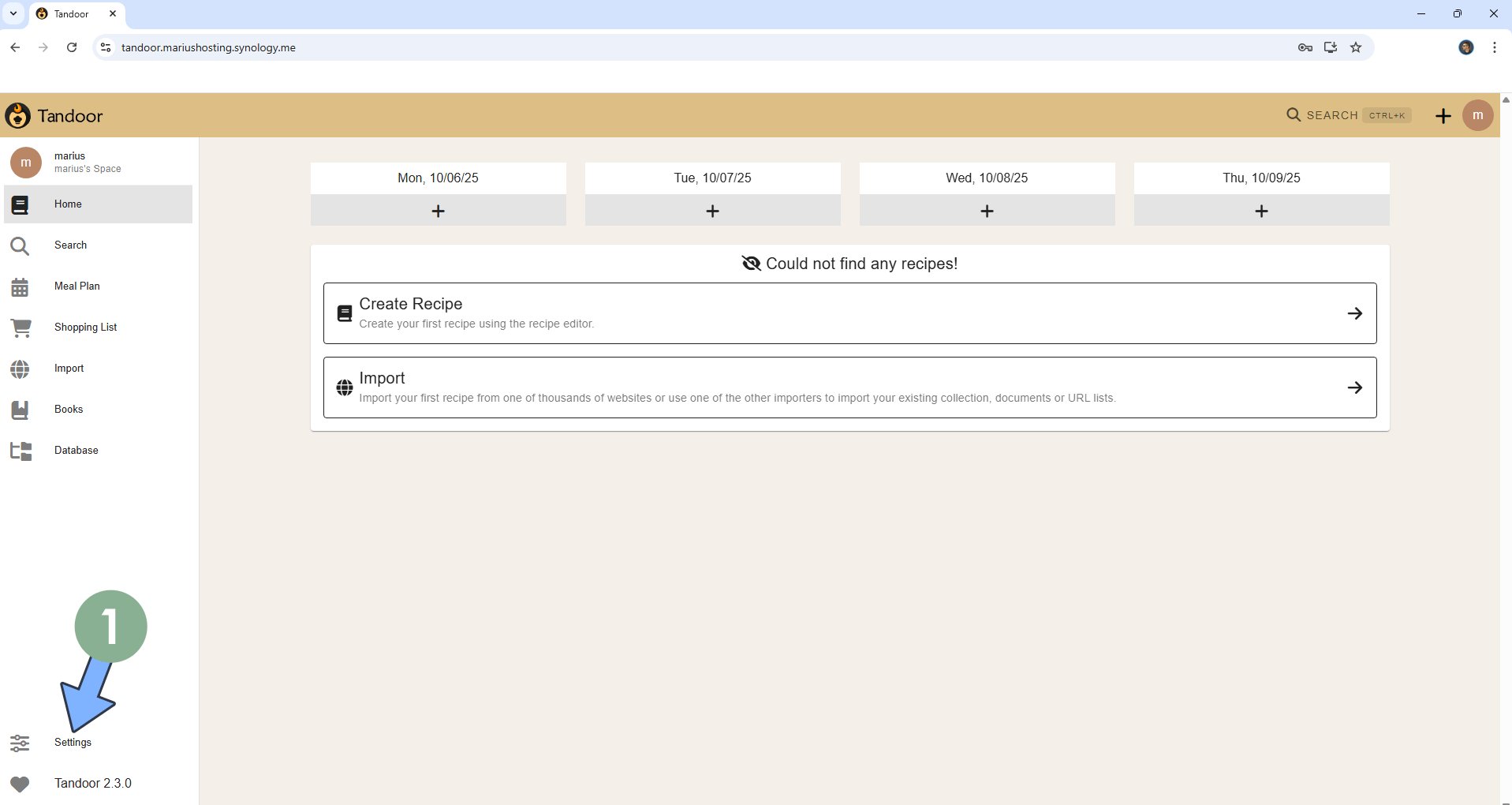
STEP 28
You can easily change the Cosmetic of your Tandoor page. Click Cosmetic, then switch the theme to Dark. Click SAVE to save the settings. Follow the instructions in the image below.
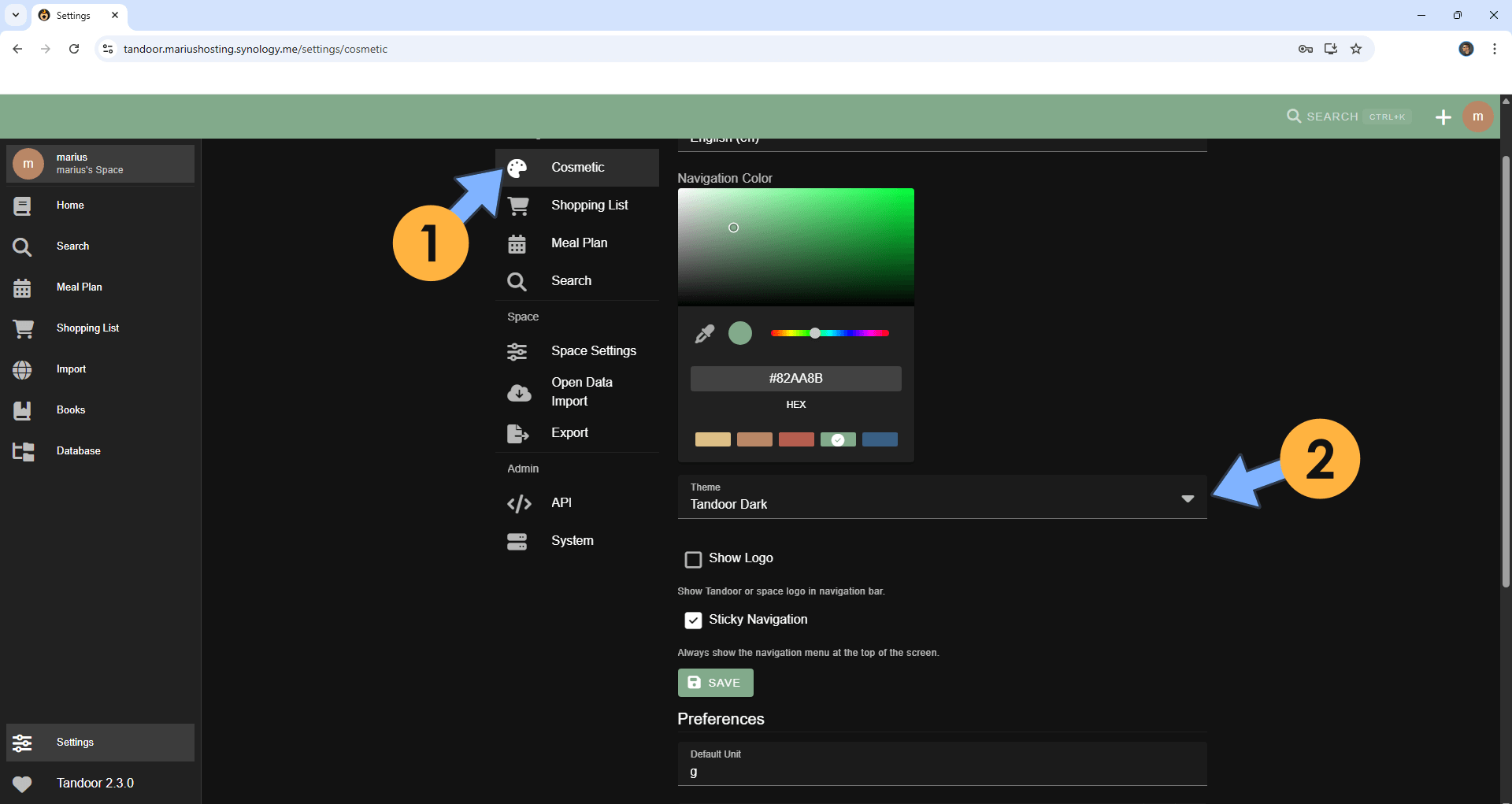
STEP 29
Click Profile, then MANAGE EMAILS. Follow the instructions in the image below.
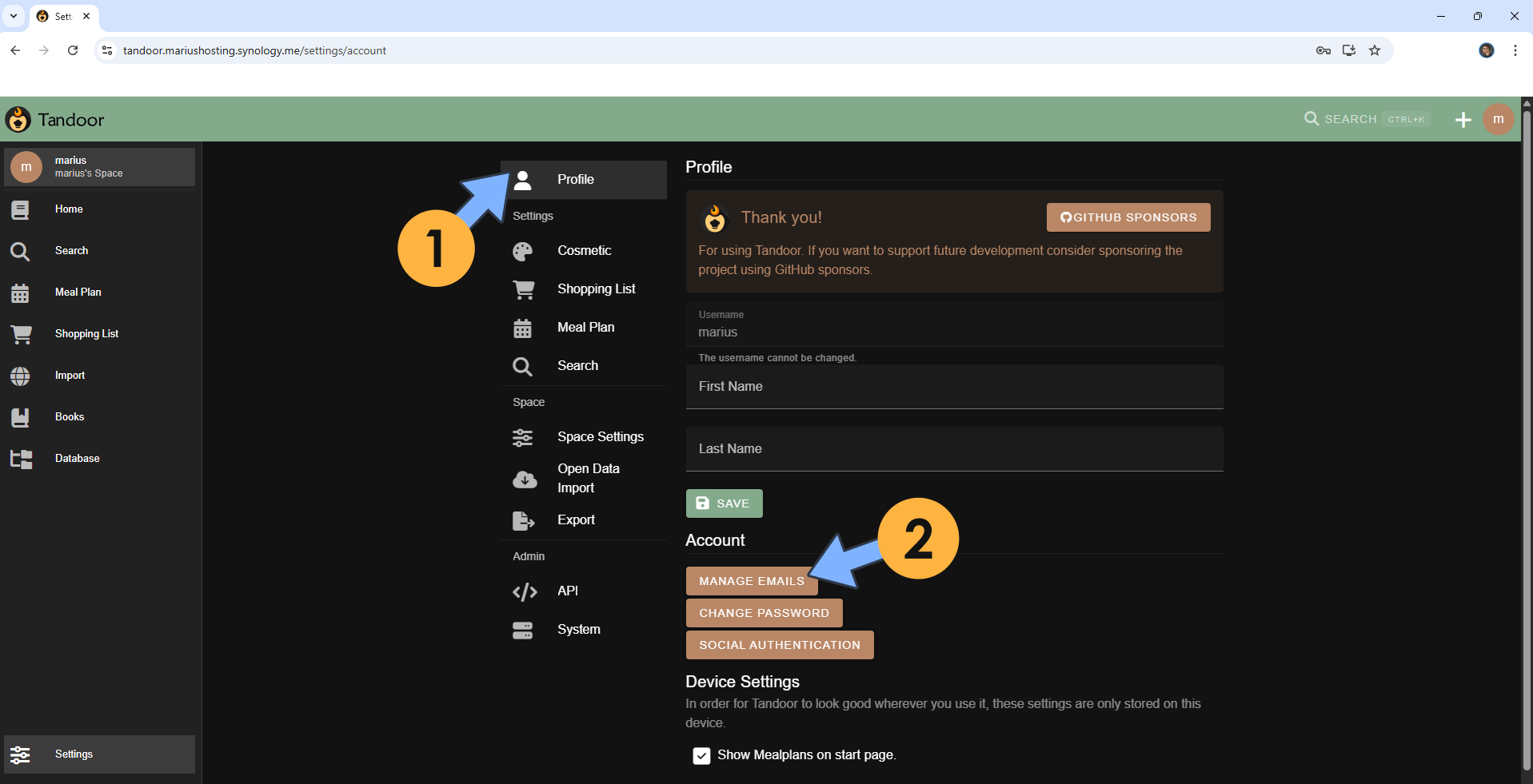
STEP 30
In the Email field, type in your own email address, then click Add E-mail. Follow the instructions in the image below.
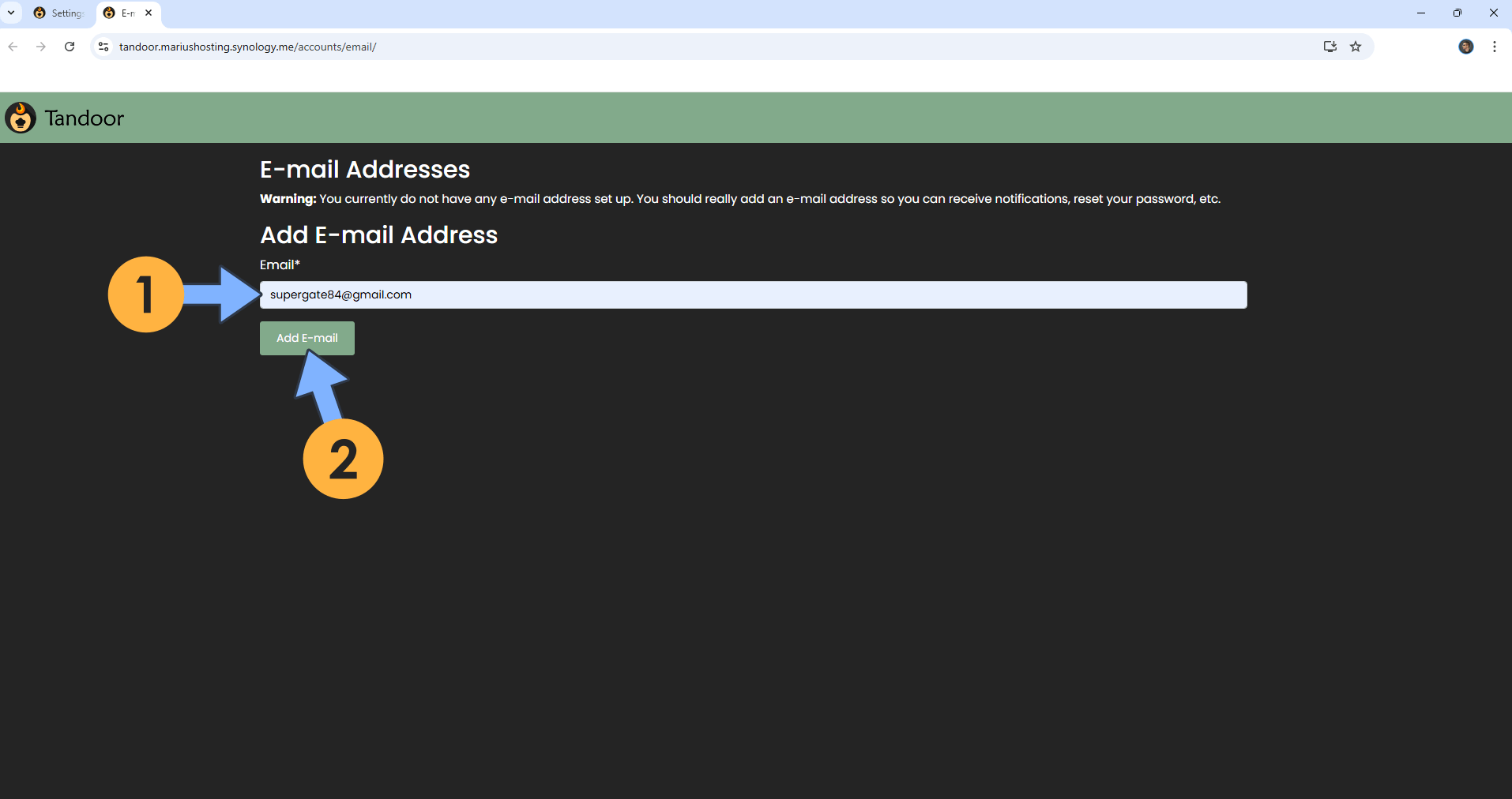
STEP 31
Check your Email, then click on the confirmation link. Follow the instructions in the image below.
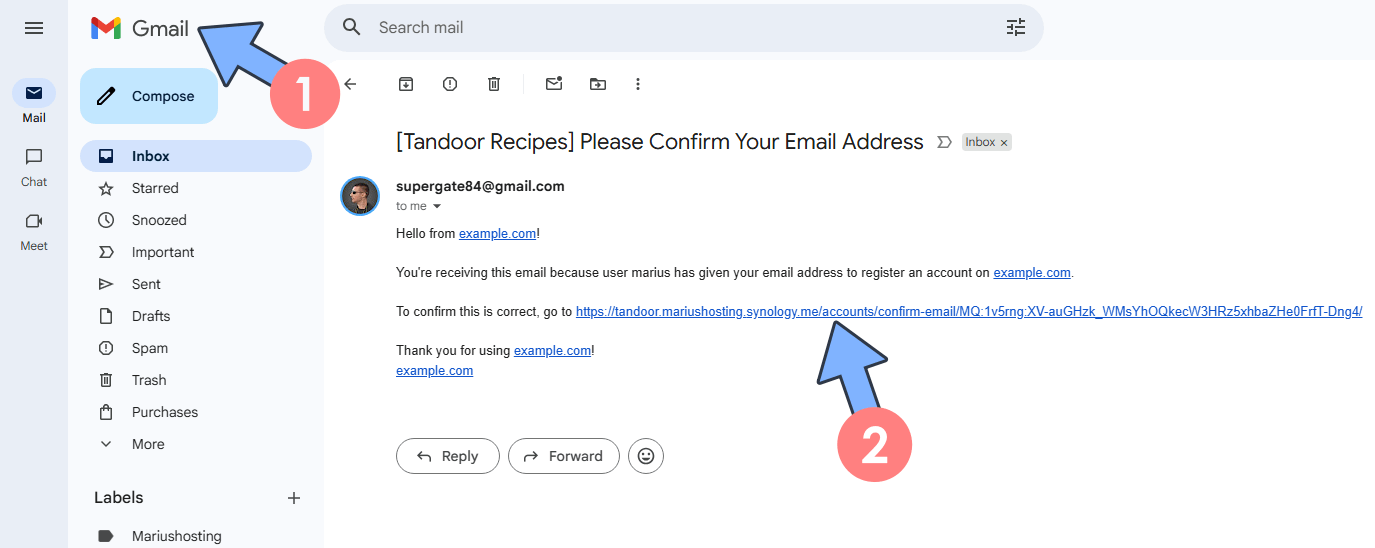
STEP 32
Click Confirm. Follow the instructions in the image below.
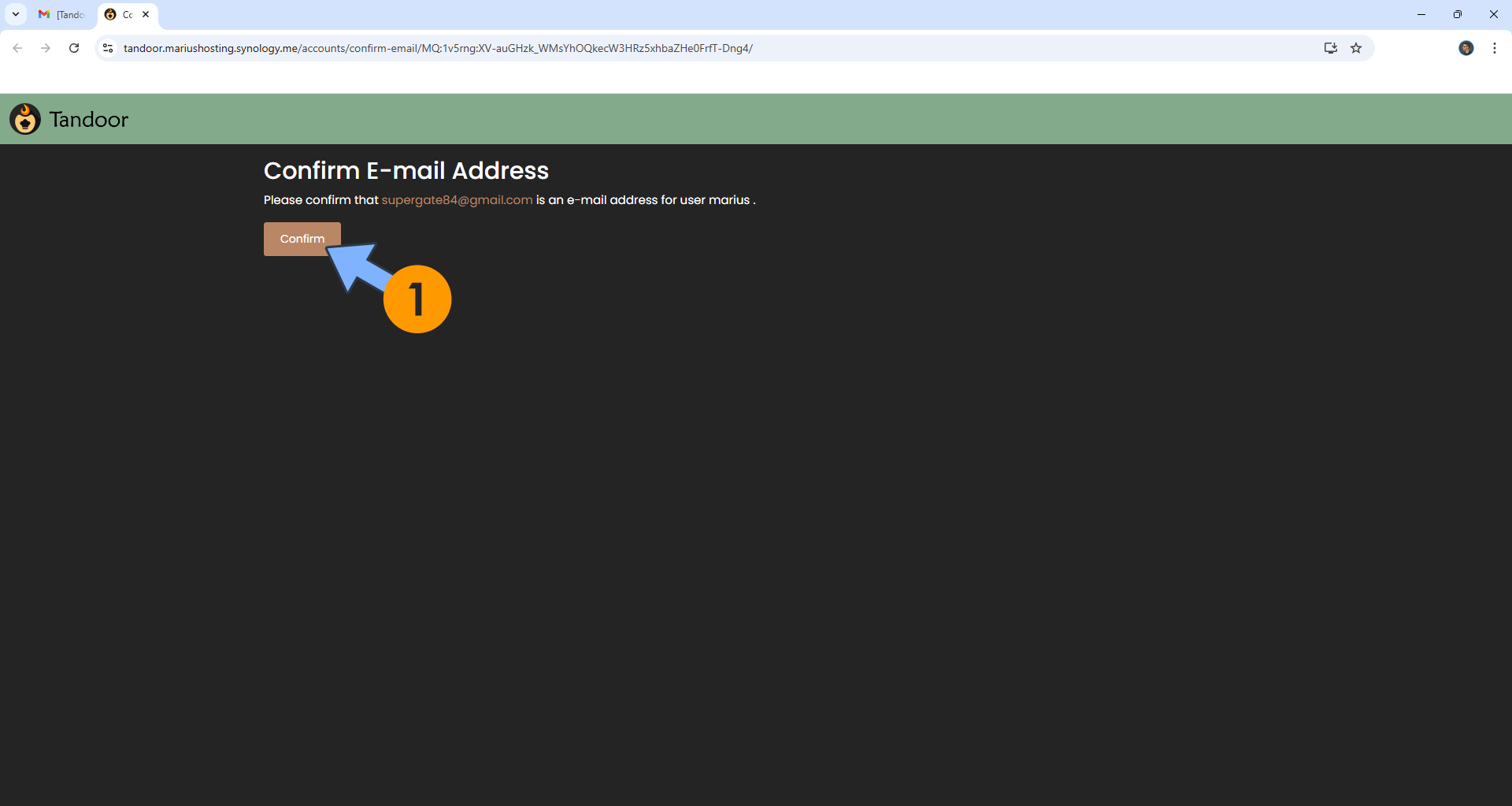
Enjoy Tandoor Recipes!
If you encounter issues by using this container, make sure to check out the Common Docker issues article.
Note: Find out how to update the Tandoor Recipes container with the latest image.
Note: How to Back Up Docker Containers on your Synology NAS.
Note: Can I run Docker on my Synology NAS? See the supported models.
Note: How to Free Disk Space on Your NAS if You Run Docker.
Note: How to Schedule Start & Stop For Docker Containers.
Note: How to Activate Email Notifications.
Note: How to Add Access Control Profile on Your NAS.
Note: How to Change Docker Containers Restart Policy.
Note: How to Use Docker Containers With VPN.
Note: Convert Docker Run Into Docker Compose.
Note: How to Clean Docker.
Note: How to Clean Docker Automatically.
Note: Best Practices When Using Docker and DDNS.
Note: Some Docker Containers Need WebSocket.
Note: Find out the Best NAS Models For Docker.
Note: Activate Gmail SMTP For Docker Containers.
This post was updated on Monday / December 8th, 2025 at 1:06 PM
